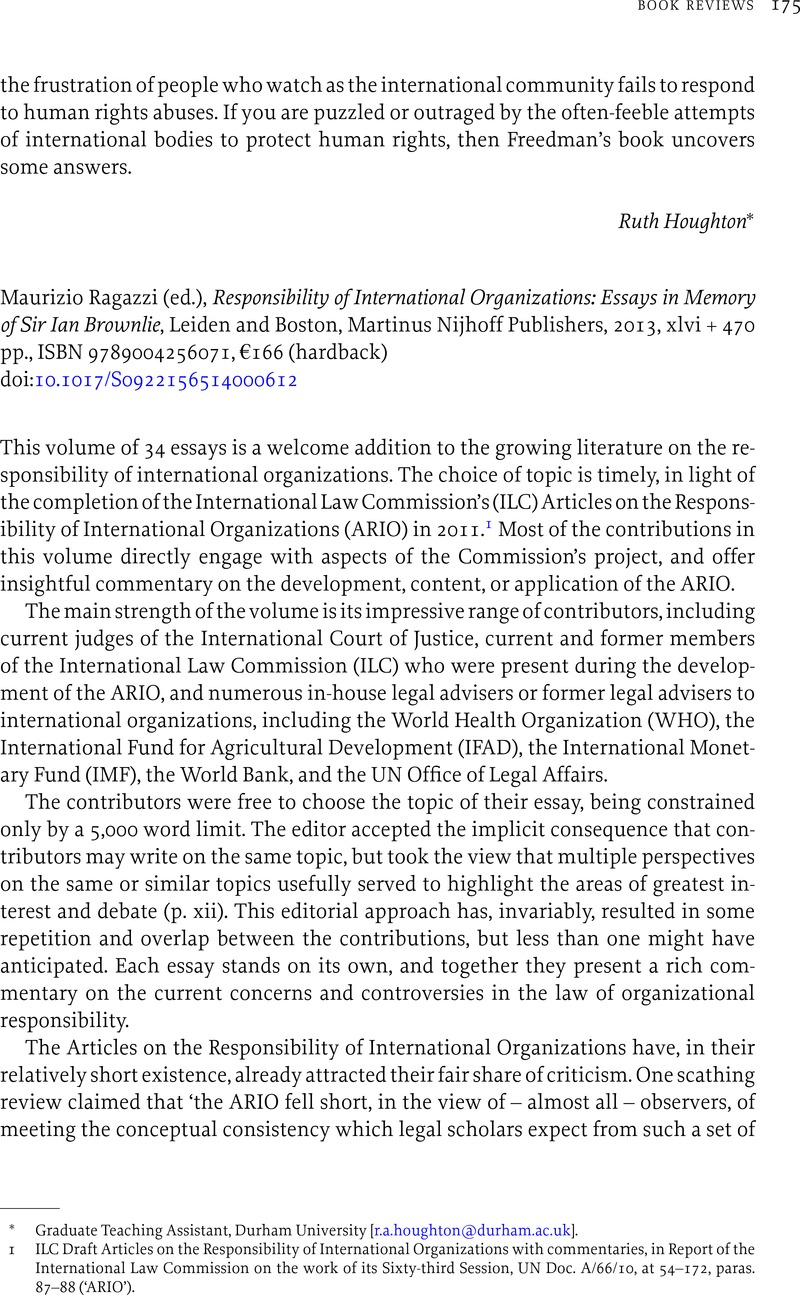No CrossRef data available.
Article contents
Maurizio Ragazzi (ed.), Responsibility of International Organizations: Essays in Memory of Sir Ian Brownlie, Leiden and Boston, Martinus Nijhoff Publishers, 2013, xlvi + 470 pp., ISBN 9789004256071, €166 (hardback)
Published online by Cambridge University Press: 27 January 2015
Abstract

- Type
- BOOK REVIEWS
- Information
- Copyright
- Copyright © Foundation of the Leiden Journal of International Law 2015
References
1 ILC Draft Articles on the Responsibility of International Organizations with commentaries, in Report of the International Law Commission on the work of its Sixty-third Session, UN Doc. A/66/10, at 54–172, paras. 87–88 (‘ARIO’).
2 d’Aspremont, J., ‘The Articles on the Responsibility of International Organizations: Magnifying the Fissures in the Law of International Responsibility’, (2012) 9 International Organizations Law Review 15CrossRefGoogle Scholar, at 16–17.
3 Thus, d’Aspremont: ‘fundamentally, the design of the ARIO was hindered by the vocabulary and framework inherited from the ASR’. Ibid., at 17.
4 G. Gaja, Special Rapporteur, First Report on Responsibility of International Organizations, UN Doc. A/CN.4/532 (2003), at 6–7.
5 G. Gaja, Special Rapporteur, Sixth Report on Responsibility of International Organizations, UN Doc. A/CN.4/597 (2008), at 2–3.
6 Ibid., at 3.
7 As explained by the International Court of Justice (ICJ) in its Nuclear Weapons (WHO Request) advisory opinion: ‘International organizations are subjects of international law which do not, unlike States, possess a general competence. International organizations are governed by the ‘principle of speciality’, that is to say, they are invested by the States which create them with powers, the limits of which are a function of the common interests whose promotion those States entrust to them.’ Legality of the Use by a State of Nuclear Weapons in Armed Conflict, Advisory Opinion, [1996] ICJ Rep. 66, at 78, para. 25.
8 See, e.g., the joint statement of 13 organizations (Comprehensive Nuclear-Test-Ban Treaty Organization; International Civil Aviation Organization, IFAD, International Labour Organization, International Maritime Organization, International Organization for Migration, International Telecommunication Union, UNESCO, World Tourism Organization, WHO, World Intellectual Property Organization, World Meteorological Organization, and the World Trade Organization) in Comments and Observations Received from International Organizations, UN Doc. A/CN.4/637 (2011), at 10. See also G. Gaja, Special Rapporteur, Eighth Report on Responsibility of International Organizations, UN Doc. A/CN.4/640 (2011), at 5–6.
9 Comments and Observations Received from International Organizations, supra note 8, at 10 (IMF), at 13 (Organization for Economic Co-operation and Development), at 14 (World Bank).
10 ARIO, supra note 1, General Commentary, at para. (5).
11 Ibid.
12 Though the UN noted that its own use of the term of ‘effective control’ differs from the application to which that term has been put by the Commission in Art. 7 ARIO. See Comments and Observations Received from International Organizations, UN Doc. A/CN.4/637/Add.1 (2011), at 13–14.
13 Ryngaert, C., ‘Supreme Court (Hoge Raad), State of the Netherlands v. Mustafić et al., State of the Netherlands v. Nuhanović, Judgments of 6 September 2013’, (2013) 60 Netherlands International Law Review 441CrossRefGoogle Scholar, at 443.
14 Ibid.
15 Brownlie, I., ‘The Responsibility of States for the Acts of International Organizations’, in Ragazzi, M. (ed.) International Responsibility Today: Essays in Memory of Oscar Schachter (2005), 355Google Scholar–62. Ragazzi describes the 2013 volume (under review) as a ‘companion volume’ to the earlier collection of essays from 2005 (at xiii).
16 Ibid., at 359.
17 Ibid., at 362.
18 ILC, 58th Session, Provisional Summary Record of the 2892nd Meeting of 12 July 2006, UN Doc. A/CN.4/SR.2892, at 9 (Brownlie).
19 ARIO, supra note 1, Art. 62, commentary paras. (2), (10).
20 Yee, S., ‘The Responsibility of States Members of an International Organization for its Conduct as a Result of Membership or Their Normal Conduct Associated with Membership’, in Ragazzi, M. (ed.) International Responsibility Today: Essays in Memory of Oscar Schachter (2005), 435–54Google Scholar.
21 Yee similarly reads the commentary to Art. 40 as a ‘rule of interpretation’, which favours an implied obligation on member states to enable remedies when the rules of the organization are silent or unclear (pp. 331, 335–6). See also Pellet's illuminating discussion of the drafting history of Art. 40 (pp. 50–53).
22 Judgment No. 2867 of the Administrative Tribunal of the International Labour Organization upon a Complaint Filed against the International Fund for Agricultural Development, Advisory Opinion, [2012] ICJ Rep. 10.




